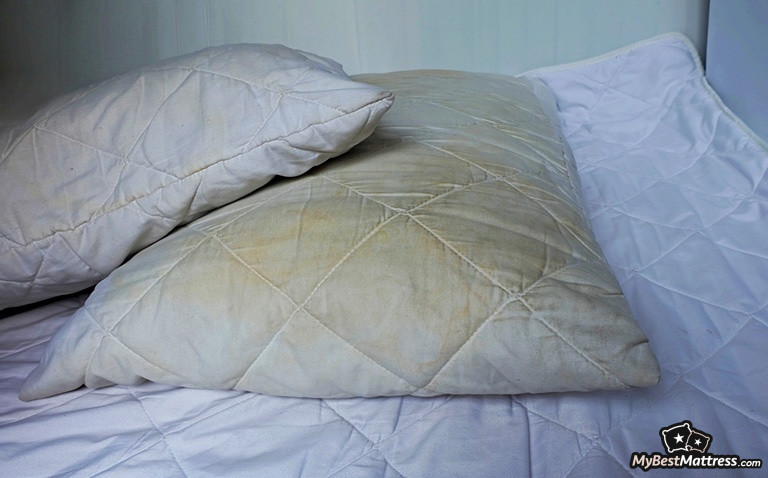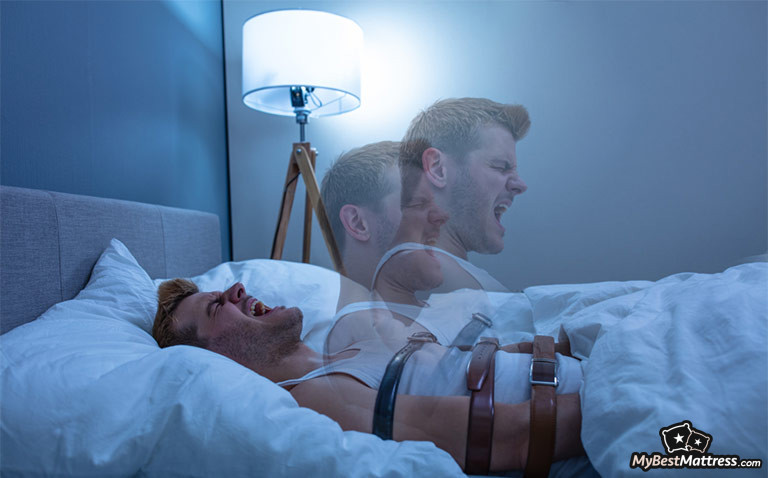
Sleep paralysis is one of the scariest experiences that many of us have felt at least once in our lives. 5% of people suffer from regular episodes of sleep paralysis that can lead to serious mental issues and insomnia.
Sleep paralysis is when a person is waking up or falling asleep, and is aware of the surroundings but cannot move or speak. During such episodes, you might hallucinate - feel, hear and see something that’s actually not there. Needless to say, such episodes can be traumatic and scary, people feel out of control. Sleep paralysis tends to last less than a few minutes. Some people experience this condition regularly, others might never undergo sleep paralysis.
I will get you through the history of sleep paralysis, explain its causes and symptoms together with sleep paralysis hallucinations, how to stop it. Then I will introduce you to similar conditions and move to conclusions.
Table of Contents
Sleep Paralysis Through History
If you like to dig into history, you may have come across references to sleep paralysis. Usually, it wasn’t written under the name “sleep paralysis”, rather described as terrifying experiences, such as being held, choked and seeing beings of blurry forms that may look like demons or possessions. There are many folklore and myths from around the world that tell these stories.
The very first clinical description for the sleep paralysis was “Incubus or the Night-mare” in 1664 by the Dutch physician who used these words to describe his patient’s experience.
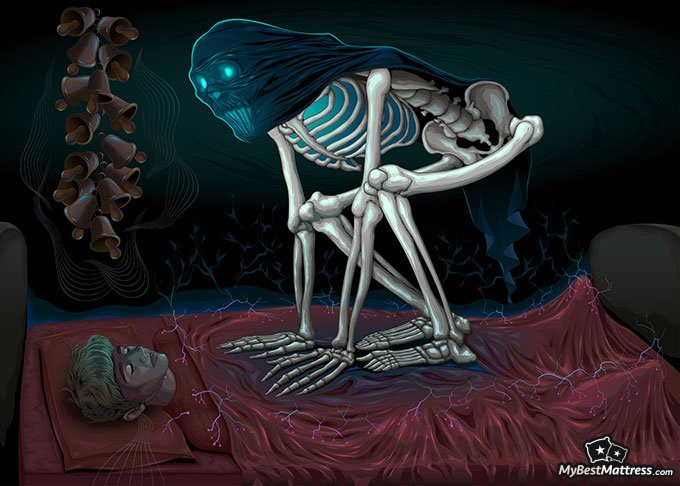
Have you ever heard of the incubus? It’s a demon that people held responsible for all the bad dreams from ancient Mesopotamia to the Roman Empire. Translated from Latin, it means ‘to sit on’. It refers to the being, later called the incubus who sat on peoples’ chests during the nightmares. People thought that he was the cause of the horrifying dreams.
Mara is also widely associated with sleep paralysis. It’s not actually a demon but more like a person with magical abilities that haunts humans in their dreams.
Sleep paralysis is definitely not a common phenomenon. Based on the 2011 research[1], about 7.6% of all individuals experience sleep paralysis at least once in their life.
Hallucinations During Sleep Paralysis
Sleep paralysis hallucinations are common among people who have experienced this condition. People hear sounds that they cannot explain - bussing zapping, hissing, and static noises are often reported. You can also hear clear sounds, such as whispers into your ear and all-around your room, voices and roars. These sound most often create panic and fear.
Sleep paralysis symptoms also include unpleasant and even shocking sensations. You can feel like being dragged out of the bed, and even flying. People also say that they feel strange vibrations and shivers running through their bodies. It’s like living through the horror movie.
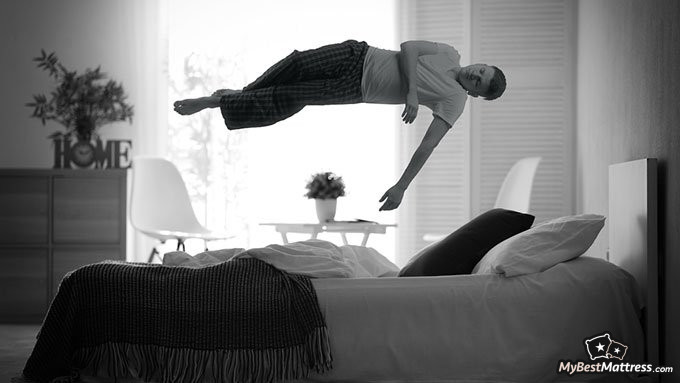
The most terrifying sleep paralysis symptoms are hallucinations. You might feel the presence of the incubus, an intruder in your room. An out-of-body experience is also quite common.
People describe sleep paralysis hallucinations differently. Some of them say that they see aliens, others cannot recognize the figure, only see dark clouds of smoke. Others say that it’s a demon or demonic possession they were seeing. Thus, each experience is different, and you may not know what’s waiting for you.
Sleep Paralysis Causes/Pathophysiology
To explain everything clearly, I want to begin from the very beginning. You can experience sleep paralysis at two times (usually):
- When you’re falling asleep - hypnagogic or predormital sleep paralysis.
- When you’re waking up - hypnopompic or postdormital sleep paralysis.
When you’re falling asleep and your body starts sinking into the sleep. During this stage, you’re not aware that you cannot move, however, if you would be, you would notice that you cannot move or make a sound.
Processes happening when you’re waking up are completely different. When you fall asleep, you go through four or five sleep cycles throughout the night (one lasts about 90-120 minutes) and experience REM and NREM sleep.
First, you experience three different stages of NREM sleep, during these stages your body relaxes, rests and restores itself. Then follow the REM (rapid eye movement) stage. This is when you experience the most vivid dreams. If you become aware during the REM sleep stage, you might notice that you cannot move or speak.
Studies show that people who experience sleep paralysis have shorter REM stage response times and also have shorter periods of NREM and REM sleep stages[2]. It clearly shows that one of the sleep paralysis causes is the disruption in your sleep cycle and sleep patterns.
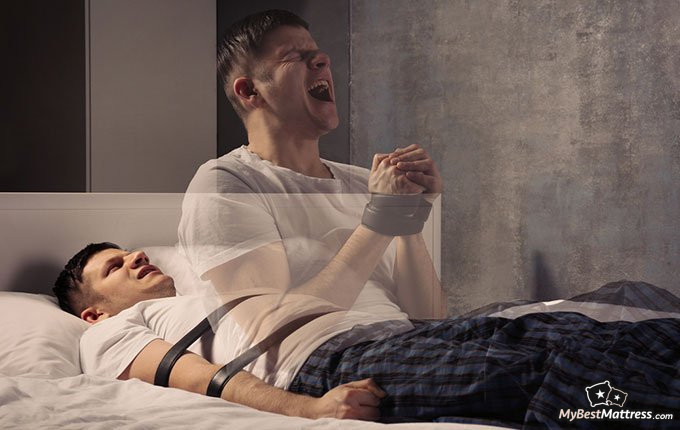
Another important theory is that neural functions that are responsible for sleep regulation are out of balance. This means that instead of going through different stages of sleep in rotation, your sleep stages might overlap.
One more aspect that can cause sleep paralysis is almost non-blocking of exogenous stimuli. It means that a person can be woken up from sleep way easier. The disruption in the regulation of melatonin can be also what causes sleep paralysis.
All these conditions are the most logical explanation of the disruption in sleep cycles, why REM sleep overlaps with waking stages, and can easily explain why you wake up but without the ability to move or speak - feeling paralyzed.
Sleep paralysis causes are often associated with:
- Sleep deprivation or insomnia.
- Narcolepsy - a neurological disorder that leads to sudden sleep attacks.
- Sleeping on your back.
- Family history of this condition.
- Mental conditions such as stress or bipolar disorder.
- Medications. The most common are ADHD medications.
If you have experienced sleep paralysis only once or twice in your life, there’s no need to be worried. As mentioned before, many people have experienced this condition at least once in their lives. The regular occurrence of sleep paralysis, on the other hand, can be the consequence of even more serious problems.
How to Stop Sleep Paralysis?
It’s pretty clear what causes sleep paralysis, but another important question is how to stop it?
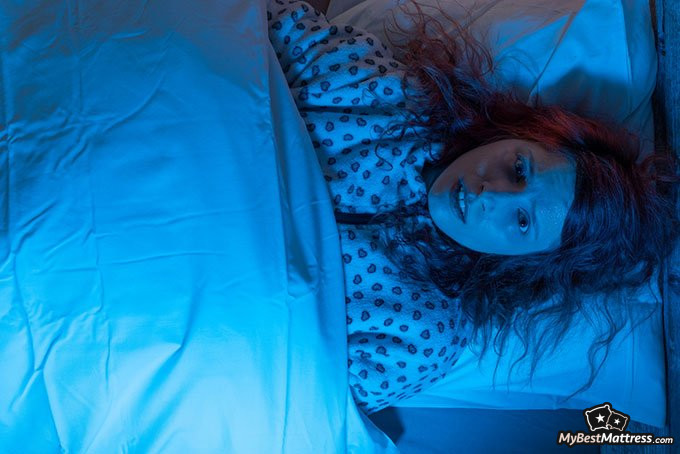
Sleep paralysis usually requires no treatment, it tends to come and go. However, if you experience this condition frequently, then you need to look for causes and start making changes. You should start from:
- Getting a good night's sleep. An adult should get from 6 to 8 hours a day of quality sleep.
- Sleeping routine. You should try to go to sleep and wake up at the same time. The routine can help you treat insomnia that is one of the causes of sleep paralysis.
- Setting your sleeping environment. When you fall asleep, your body temperature decreases by about 2 degrees Fahrenheit. So, you should also make sure that your bedroom is not too hot and minimize the temperature a little bit. Also, get rid of all the light sources and keep it quiet (if you have loud neighbors then you can get earplugs). And get a comfortable mattress, if you haven't done that yet.
- Healthy lifestyle. If you’re looking at how to stop sleep paralysis, a healthy lifestyle is one of the best methods. If you’re not exercising, you should start doing that regularly. Also, get rid of alcohol, smoking, and fast food, or at least try to minimize it as much as possible. What’s more, avoid eating big meals before bed. If you’re starving then choose a healthy snack instead.
Also, doctors sometimes prescribe a course of antidepressant medication (for example, clomipramine). They’re used in smaller doses than when used by people who suffer from depression and work by modifying the sleep cycle.
Note that before using medication, you should talk to your doctor.
Similar Conditions
If you experienced something that seems like a sleep paralysis based on definition, you should also be aware of similar conditions, maybe they’re actually what’s troubling you.
Exploding head syndrome (EHS)
It’s a condition when a person hears unreal noises when waking up and falling asleep. Such noises are usually loud and of short duration. Exploding head syndrome is not associated with a serious disease, however, it’s frightening and highly unpleasant, just like sleep paralysis.
The real cause of this condition is unknown, but some of the most-likely explanations include:
- Nerve dysfunction
- Temporal lobe seizure
- Ear problems
- Genetic changes
Women can be more affected by this condition than men. And, unfortunately, the EHS research gap still exists.
Nightmare disorder (ND)
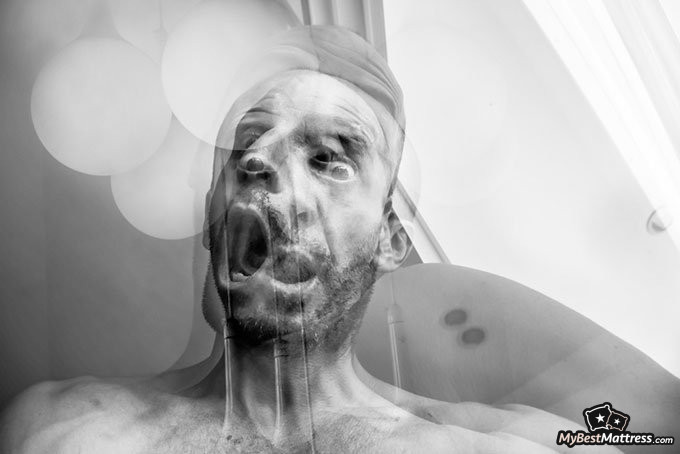
Also called a dream anxiety disorder. People who suffer from this disorder experience frequent nightmares that often threaten their personal safety. It appears in the REM stage of sleep when dreams are the most vivid.
This disorder is a little bit similar to the sleep terror episode, just so much more terrifying. People who experience nightmare disorder can remember everything they were dreaming about, and individuals who suffer from sleep terror episode, wake up freaked out without actually remembering the dream. It occurs during the NREM stage.
Such a condition can be caused by stress, irritation or pressure. Nightmare disorder is experienced by 4% of adults[3] and can affect both men and women. It can be treated using stress reduction techniques, such as meditation, exercise, and yoga.
Sleep terrors (STs)
Considered a parasomnia, occurs in episodes of scream and deep fear while still being asleep. This condition is mostly experienced by children and can last from a few seconds to a few minutes, and even longer.
The main factors that can cause sleep terrors are:
- Stress
- Fewer
- Medication
- Young age
- Sleep deprivation
Sleep terrors normally appear when waking up from delta sleep. Such sleep usually appears during the first half of your sleep cycle. Thus, this parasomnia is most common for people who experience longer episodes of delta sleep.
Even though many children experience night terrors, there’s nothing to be worried about - they simply outgrow this disorder.
Nocturnal panic attacks (NPAs)
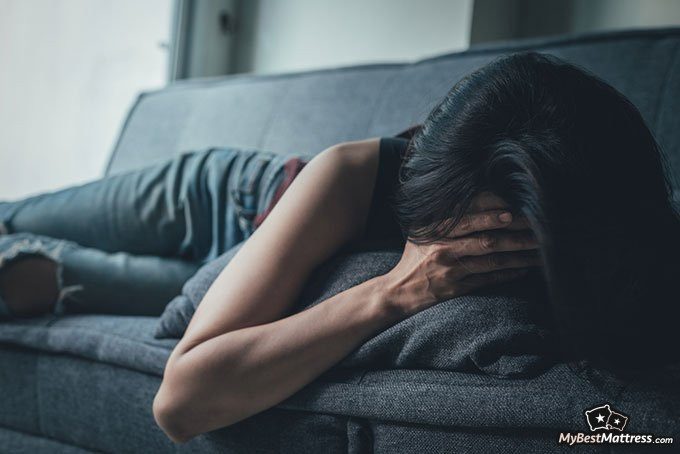
Panic attacks appear as sudden periods of intense terror. During the nocturnal panic attack, you can begin shivering, sweating, shortness of breath and get a feeling as if something very bad is about to happen.
They’re not physically dangerous, however, can signalize about other, more serious diseases such as:
- Posttraumatic stress disorder
- Depression
- Panic disorder
- Social anxiety disorder
- Medical problems
If you’re experiencing frequent panic attacks, you should start applying techniques that can help you to reduce stress, such as yoga or meditation. And you should consult your doctor right away, he might prescribe you medication.
Posttraumatic stress disorder (PTSD)
The most visible symptoms of posttraumatic sleep disorder are difficulty falling or staying asleep. It’s a mental health condition that’s caused by a shocking event.
You can experience disturbing thoughts and terrifying dreams - nightmares. It’s known that people who experience interpersonal trauma are more likely to develop PTSD, whereas those who have experienced non-assault based trauma have fewer chances.
Posttraumatic stress disorder is usually treated using certain medications and counseling.
Therefore, even if sleep paralysis is considered as the scariest experience, there are other disorders that can be more than unpleasant.
Conclusions
Thus, as promised in the very beginning, I’ve answered the question - “what causes sleep paralysis?”, explained sleep paralysis symptoms and how to stop it.
So, many people have experienced sleep paralysis at least once in our lives - 5% of people suffer from regular episodes of being aware of their surroundings but not being able to speak or move.
During sleep paralysis, people hear sounds they cannot explain, feel unpleasant sensations, such as being dragged out of the bed and even flying. They often experience hallucinations that people describe as a dark figure, demon or demonic possession, dark clouds of smoke and even aliens.
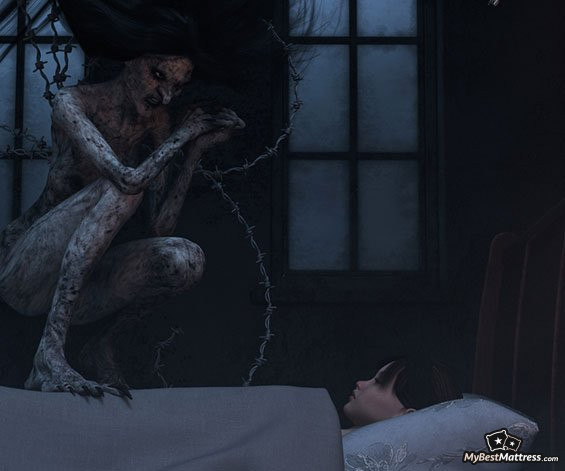
If you’re searching for how to stop sleep paralysis, you should start living healthier, get a good night's sleep, set your sleeping environment properly, and create a sleeping routine. If you have more concerns, you should contact your doctor without hesitation.
Also, if you’re experiencing similar symptoms to sleep paralysis but not completely sure that’s what you’re going through, then you should take a look into similar conditions, such as exploding head syndrome, nightmare disorder, sleep terrors, nocturnal panic attacks and posttraumatic stress disorder - maybe they will give you the answer.
Scientific References
1. Brian A. Sharpless and Jacques P. Barber: 'Lifetime Prevalence Rates of Sleep Paralysis: A Systematic Review'
2. Björn W. Walther, Hartmut Schulz: 'Recurrent isolated sleep paralysis: Polysomnographic and clinical findings'
3. Timothy I. Morgenthaler, Sanford Auerbach, Kenneth R. Casey: 'Position Paper for the Treatment of Nightmare Disorder in Adults: An American Academy of Sleep Medicine Position Paper'
Leave your honest feedback
Leave your genuine opinion & help thousands of people to choose the best mattress. All feedback, either positive or negative, are accepted as long as they’re honest. We do not publish biased feedback or spam. So if you want to share your experience, opinion or give advice - the scene is yours!






